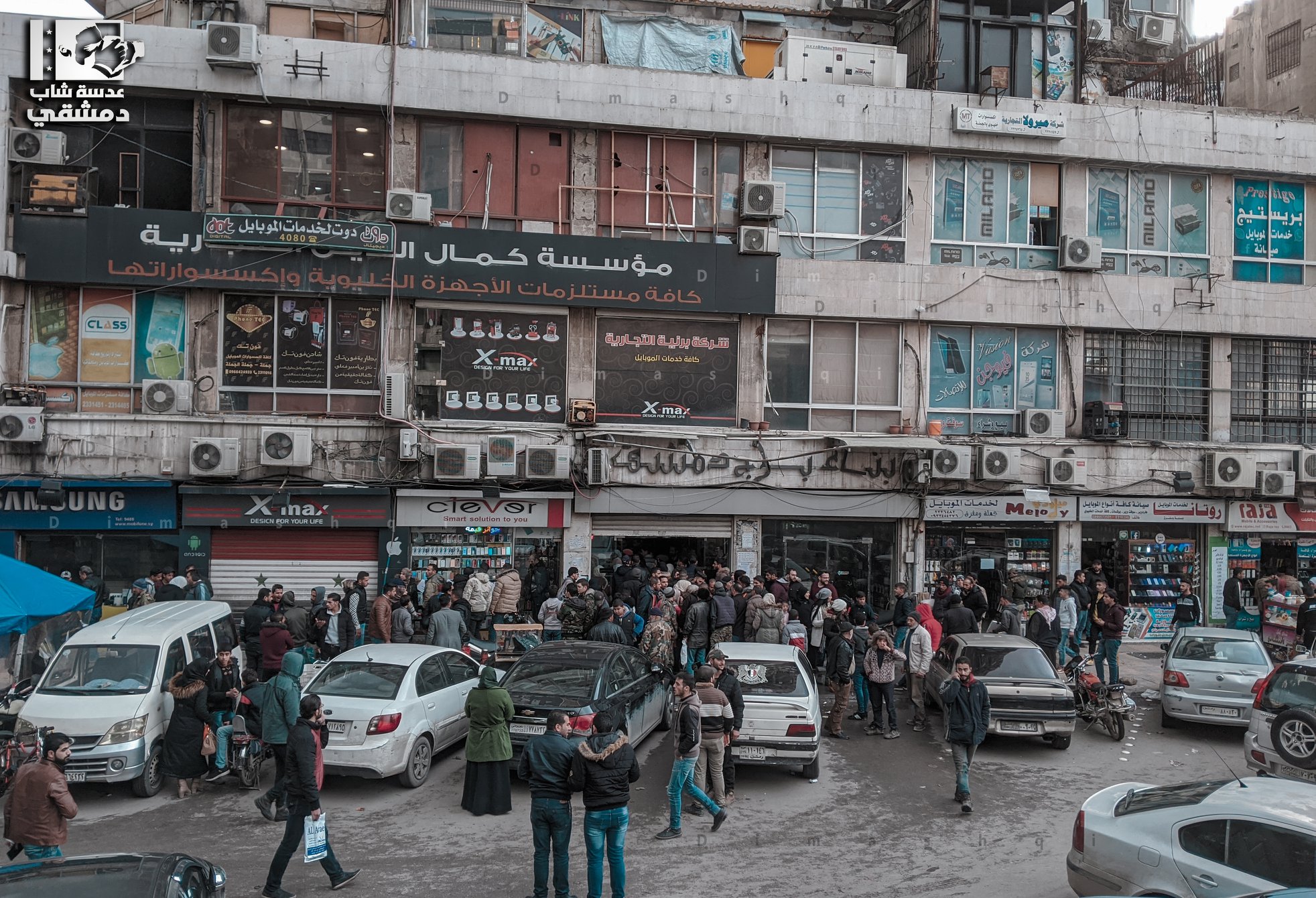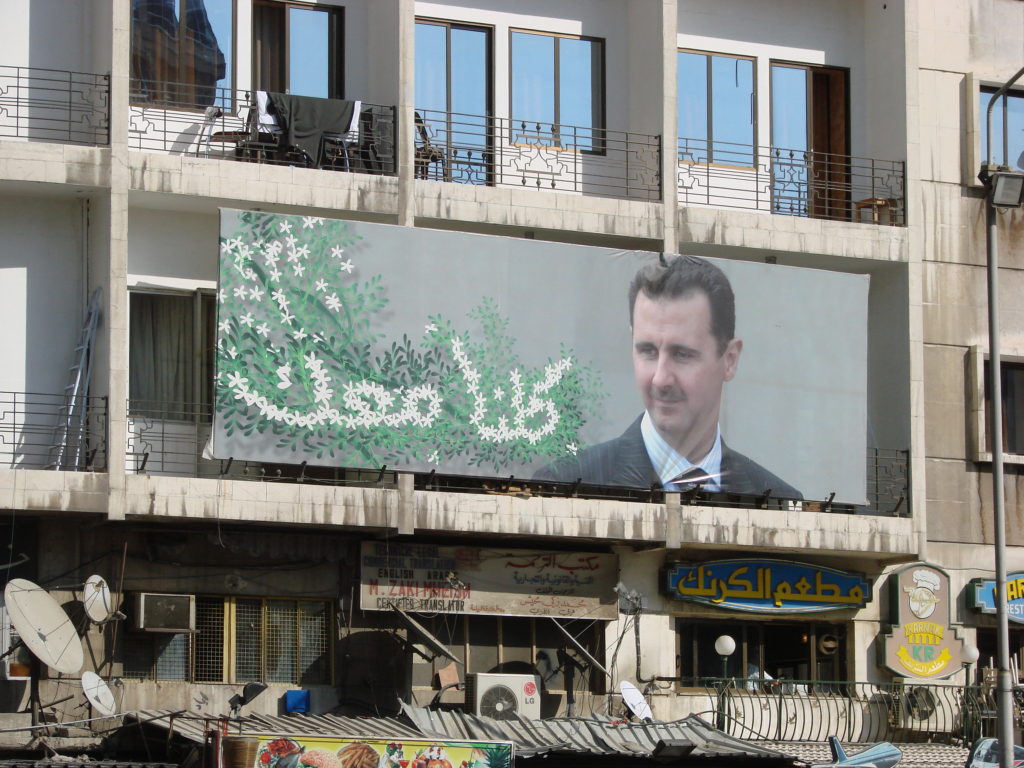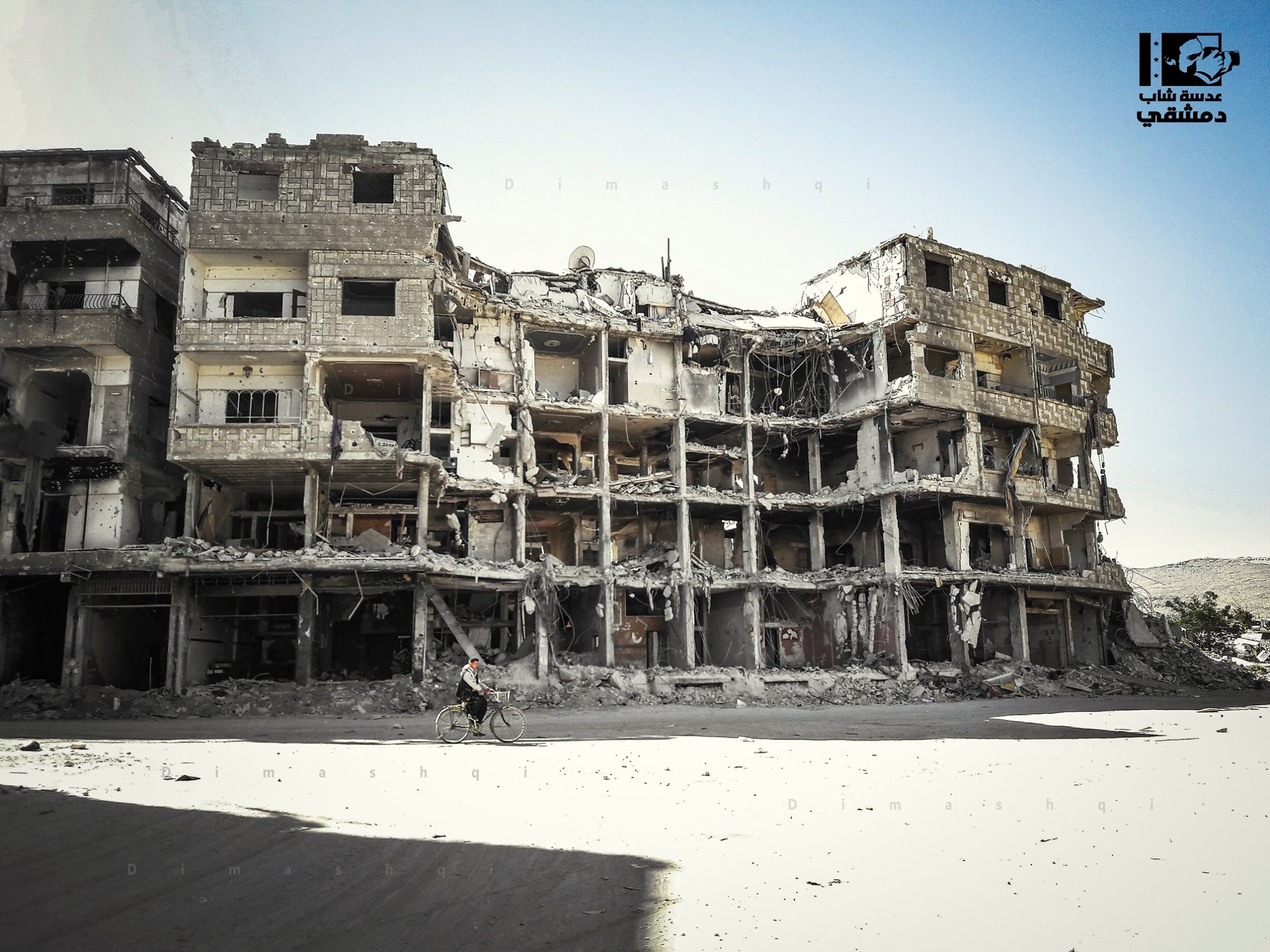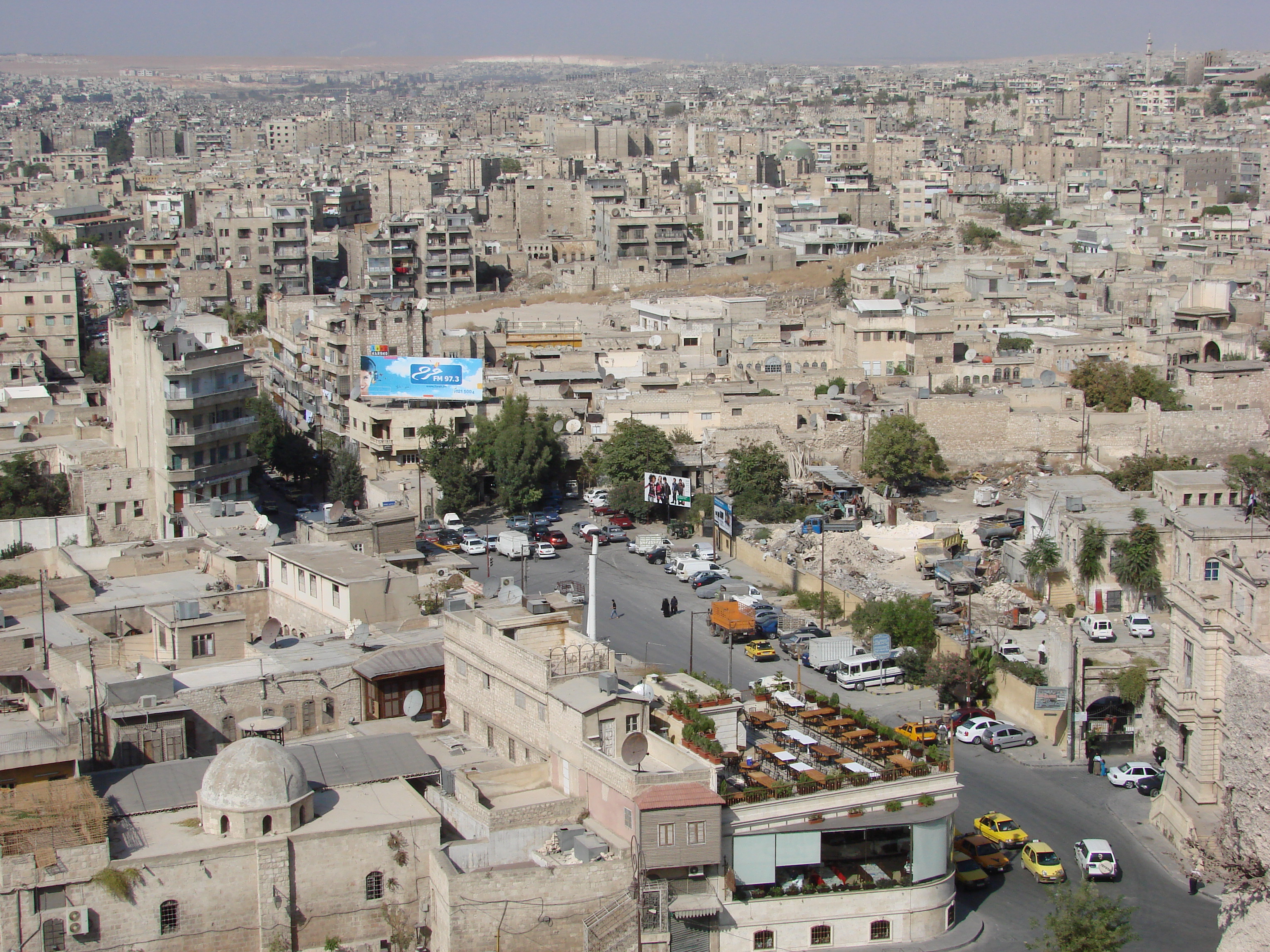The collapse was unprecedented.
First, in May, the Syrian lira plummeted to 2,000 liras to the dollar on the black market, then to 3,000—all in the space of weeks. The Syrian currency had never before been worth so little. Meanwhile, the central bank held the official exchange rate at around 700 liras per dollar, before finally devaluing to 1,256 this week.
The lira's freefall has been disastrous for ordinary Syrians, already struggling to purchase food, pay rent and rebuild their lives following years of war. The vast majority of them remain trapped beneath the poverty line even as the government approves glossy new real estate projects over the ruins of bombed-out districts.
And a wide reaching set of US sanctions, approved in December but finally put into effect this week, are poised to make economic recovery even more difficult.
Named after Caesar, the pseudonym of a former forensic photographer with Syria’s military police who defected in the early years of the war and smuggled tens of thousands of photos detailing human rights violations out of the country, the sanctions bill threatens entire sectors of the Syrian economy, as well as individuals listed as aiding the Assad government. Supporters of the sanctions bill have praised the measure as a step towards accountability for the Syrian government’s years of war crimes.
Syria already faces a labyrinth of international sanctions imposed over decades. But the Caesar Act sanctions are set to be the toughest yet. As the new measures officially went into effect on Wednesday, dozens of individuals and companies associated with the Syrian government were newly listed—including President Bashar al-Assad’s British-born wife, Asma.
Ostensibly, the act includes exemptions to mitigate the impact on everyday Syrians. But what exactly that could include is unclear, as international aid organizations now must decipher what the Caesar Act could mean for their operations on the ground, says Basma Alloush, Policy and Advocacy Advisor at the Norwegian Refugee Council. Meanwhile, sweeping measures against entire sectors, such as construction, could impact the chance for ordinary people to rebuild their homes and, ultimately, their lives.
“We need to have an honest discussion about what the actual impacts of sanctions are on ordinary civilians,” Alloush, who last week co-authored an opinion piece on the Caesar Act with researcher Alex Simon, tells SyriaUntold.
“I think that piece is really missing in the debate.”
The Caesar Act finally went into effect on Wednesday. What can we actually expect to start seeing in the short-term?
Because Syria has been under numerous sanctions that have been significantly ramped up since 2011, I think in the short term, we will not see a significant change. Maybe some hindrances in supply chains and things like that, but we are already seeing those issues with medicine being unavailable, with shops closing because of inflation, with currency devaluation. So in the short term I do not suspect the change is going to be too drastic.
What about in the long term? What do you see in the months and years ahead?
I think in the long term specifically is where this act could really have an impact. Right now the sunset clause is five years, but...once sanctions are imposed it is really difficult to lift them.
The requirements that are laid out in the Caesar Act are really broad and quite unrealistic, [for example] when they are talking about the release of all political prisoners and steps towards accountability. What does that actually mean, and do we really think that is going to happen in five years? Chances are, these sanctions will not be repealed in five years.
There is a tendency towards overcompliance by banks and other businesspeople who are worried about running afoul of sanctions, and are therefore very risk averse. They take the extreme where they absolutely do not engage in trade with any Syrian business owner.
Any chance for an ordinary Syrian to try and rebuild their life is really prevented and blocked by this act. Any attempts by Syrian diaspora members to help their families still inside Syria will be challenging [as well].
For instance, it is really difficult for me to find ways to send any money to my family members who are back home [in Syria]. I do not see that getting easier as this act is implemented—especially in the long run where people’s homes are typically impacted [by the war]. They would have experienced some kind of damage to their property or to their livelihood.
The ability for Syrians in the diaspora or inside Syria to rebuild their lives is going to be difficult under the Caesar Act, with all the restrictions, and the fact that they are so sweeping, with sectoral sanctions being imposed. They are not just targeted sanctions.
The construction sector as a whole is going to be targeted [for example]. So for materials that are required to build physical structures, costs are going to remain extremely high. Syrians who have lost everything will continue struggling to afford any of these goods that could contribute to an attempt to rebuild their lives.
And for other vital goods like medicines, how might new sanctions impact access?
From a legal perspective, medicines are not actually blocked by sanctions. Legally you are allowed to bring specific medical supplies [into Syria].
The issue, which we saw [recently] with the spread of coronavirus, is that some medical supplies or equipment could have dual use. They could be used as a treatment, but also could be manufactured in a way that could be harmful to civilians. Those are the ones with restrictions.
So an N95 [medical] mask, legally speaking, is not banned by sanctions. But a full face mask could maybe be used during a chemical weapons attack—that is prevented.
The issue with sanctions and how they impact the entry of medication and other supplies, is that there is a general overcompliance. There is a tendency towards overcompliance by banks and other businesspeople who are worried about running afoul of sanctions, and are therefore very risk averse. They take the extreme where they absolutely do not engage in trade with any Syrian business owner. That is why supplies have dwindled.
You have the issue of inflation as well. So people are closing up shops because it is cheaper for them to not operate than to operate at a loss. It is a matter of business. Alex spoke to a Syrian pharmacist who said they see people going from pharmacy to pharmacy to find essential, critical medication, and they just are not able to access it. The shortage is very clear.
Assad’s Reconstruction
05 March 2019
The Caesar Act does not actively prevent medications from going in--this is included in the humanitarian exemption—but it is the overcompliance [issue] that comes along with sanctions that makes it challenging to bring certain goods in.
As you mentioned, the Caesar Act at least ostensibly has safeguards against hurting everyday Syrians. But the language in the act mentioning this issue is fairly vague. Is that enough?
The short answer is no. The way that the humanitarian exemption is laid out, it is like you said: very vague. And it is not well defined. This creates fear in trying to [determine] what is actually going to be impacted. [Non-governmental] organizations might have an experience similar to that of banks, where they become more risk averse and therefore self-censor and protect themselves from potentially running afoul of sanctions.
As humanitarians, if we want to operate in Syria, there are certain things that require licenses. The way to get that license so far has been through a very time consuming, bureaucratically heavy process.
The one thing that I want to highlight there—and I do not think it gets a lot of attention—is the fact that the humanitarian exemptions and the licenses that are lauded by the US government only apply to US persons and entities.
So if an American organization operating in government-controlled areas in Syria wants to program in a specific area, then they can seek recourse by applying for licenses that shield them and allow them to legally operate.
The Caesar Act is specifically targeting non-US people and entities. The fact that they are putting these so-called secondary sanctions on non-US persons [means that] NGOs operating in Syria that are not American cannot seek the same recourse.
For example, if a Swedish organization operating in Damascus wants to apply for a license to safeguard against sanctions, they cannot do that. The licenses only apply to US NGOs. The Caesar Act does not outline anyway for non-US organizations to seek recourse. I think that is really problematic.
Could this have any ripple effects on NGOs operating in Idlib or other areas of Syria outside government control?
We hear concerns that this could impact operations in the [majority Kurdish-controlled] northeast, for instance. The northwest [which is mostly run by a governing body affiliated with the hardline Islamist group Hay’at Tahrir al-Sham] has not really factored into any of these conversations—rather, it is more affected by counterterrorism measures.
For the northeast, there is the issue of fuel, which is an industry that is being targeted by the Caesar Act. How is that going to be impacted? The Syrian government still has a presence in the northeast. I have more questions than answers, really.
What we have been hearing from the US government is that there are attempts to look at safeguarding against the Caesar sanctions’ impact in the northeast—at least that is promising. What we would hope is for that conversation to be expanded, and to create safeguard measures across Syria for humanitarian organizations.
But more importantly than the NGOs is the people. There need to be measures included so that people do not feel like they are being collectively punished throughout all of this; that despite the nine or 10 years of conflict they have endured, that they are not going to now face a new set of challenges.
You and Alex Simon write in your recent op-ed that proponents of sanctions tend to overstate their “power as a political tool.” Can you explain your viewpoint on this more? Where does the Caesar Act grant leverage to the US against Assad, and where does it not?
Looking at historical examples where sanctions were imposed, there is very little evidence to show a direct correlation between imposition of sanctions and political transformation or the collapse of a particular regime. The evidence is just not there.
Proponents of the Caesar Act and sanctions on Syria [tend to] end up talking about these sanctions in such grandiose terms, and in a very affirmative way; that [they believe] these sanctions are actually going to lead to justice, to accountability, to protection of civilians. In fact, previous evidence shows very little of that actually happening.
The purpose of [Alex and my] article is to recognize that...this act is a form of creating leverage and a way to prevent other countries, other businesspeople, from engaging with the Syrian government to work on reconstruction, for instance, in areas where people have been displaced.
We recognize that this is essentially the intention behind [the Caesar Act]. But at the same time, the debate on sanctions has been very binary, and it has been very difficult to break into these discussions to actually highlight that, yes, these sanctions might be a tool that the US government can use to create leverage, but that we also need to have a discussion about...the unintended consequences.
I think that piece is really missing in the debate, and that is what Alex and I are trying to contribute, so that we can create some space and have that dialogue. We are not taking a position on sanctions. What we are saying is that we need to have an honest discussion about what the actual impacts of sanctions are on ordinary civilians, and how we can safeguard against [those impacts].
What do you feel is most important for those in the humanitarian sector or watching humanitarian news in Syria to know about the potential impacts of the Caesar sanctions?
I think it is the overcompliance issue. It is widely known, but I do not think there has been a lot of effort to really push back against it and find a real solution for it.
I do not believe that these sanctions are [going to be] used as a tool to hinder humanitarian assistance. I think there are genuine efforts to try and protect the humanitarian space. But not enough has been dedicated to try and counter the overcompliance that banks and businesses have been [engaged in] that have the unintended consequences on civilians and humanitarian operations, and that have led to shortages in supplies of critical goods and services.
We need a mechanism to ensure that these critical goods continue to flow into a country that is very desperate for them.









